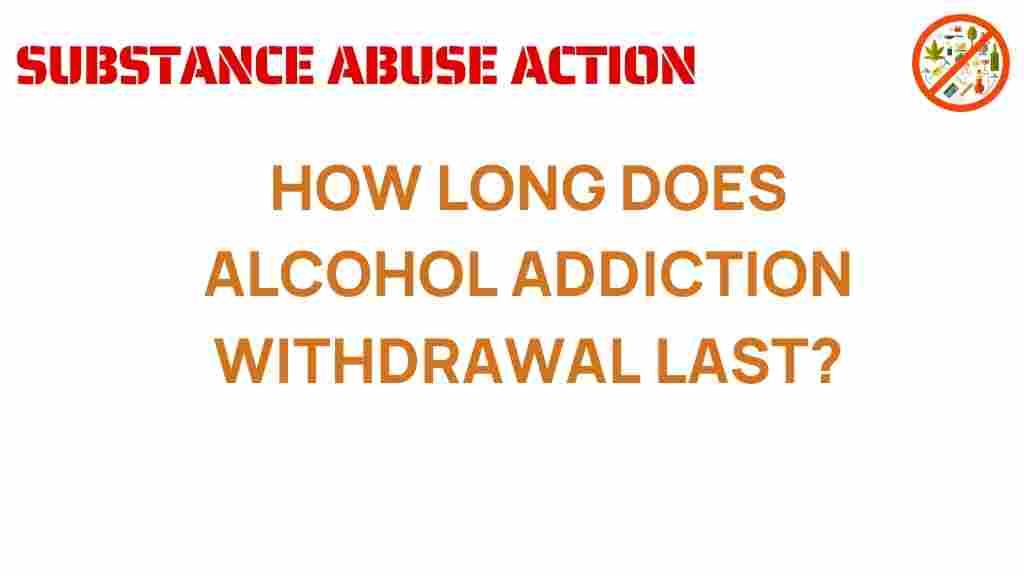Unraveling the Timeline: How Long Does Alcohol Withdrawal Last?
Alcohol withdrawal is a critical phase in the addiction recovery journey. Understanding the timeline of symptoms, their duration, and the detox process is vital for anyone dealing with alcohol addiction. This article will guide you through the symptoms timeline, treatment duration, health implications, and effective support strategies to ease the recovery journey.
Understanding Alcohol Withdrawal
Alcohol withdrawal refers to the array of symptoms that occur when a person who has been drinking heavily suddenly reduces or stops their alcohol consumption. These symptoms can range from mild anxiety to severe complications like delirium tremens (DTs). The timeline for alcohol withdrawal varies depending on several factors, including the duration and amount of alcohol consumed, overall health, and whether other substances are involved.
Alcohol Withdrawal Symptoms Timeline
The symptoms of alcohol withdrawal typically progress through a timeline that can be divided into several phases:
- 6-12 hours: Early symptoms may begin within 6 to 12 hours after the last drink. Common symptoms include:
- Anxiety
- Nausea and vomiting
- Insomnia
- Shakiness or tremors
- 24-48 hours: Symptoms can intensify, and additional symptoms may appear, such as:
- Increased heart rate
- High blood pressure
- Fever
- Hallucinations (visual or auditory)
- 48-72 hours: This is when the most severe symptoms may occur, including:
- Delirium tremens (DTs), characterized by confusion, severe agitation, and hallucinations
- Severe autonomic instability
- Seizures
It is essential to note that while most withdrawal symptoms can peak within 72 hours, some individuals may experience prolonged symptoms, known as post-acute withdrawal syndrome (PAWS), which can last for weeks or even months.
The Detox Process
The detox process is the initial phase of addiction recovery where the body clears itself of alcohol. This phase can be challenging, and medical supervision is often recommended to manage symptoms safely.
- Assessment: A healthcare provider will conduct a thorough assessment to determine the severity of the addiction and withdrawal symptoms.
- Medical Supervision: Detox should ideally occur in a medically supervised environment, especially for individuals with a history of severe withdrawal symptoms.
- Medication: Medications such as benzodiazepines may be prescribed to alleviate withdrawal symptoms and prevent complications.
- Supportive Care: Hydration, nutrition, and rest are crucial during detox. Support from healthcare providers and loved ones can enhance recovery.
Treatment Duration and Recovery Journey
The duration of treatment for alcohol addiction varies widely based on individual circumstances. Typically, the detox phase lasts from a few days to a week, while comprehensive treatment may take several weeks to months, depending on the following factors:
- Severity of Addiction: Individuals with severe alcohol use disorder may require longer treatment.
- Co-occurring Disorders: Mental health conditions can complicate recovery and may necessitate additional treatment.
- Support Systems: A strong support system can influence the length and success of the recovery journey.
For many, the recovery journey doesn’t end with detox. Ongoing therapy, support groups, and lifestyle changes are essential for sustained sobriety. Engaging in behavioral therapies, such as cognitive-behavioral therapy (CBT) or motivational interviewing, can help individuals develop coping mechanisms and address the underlying issues related to their addiction.
Health Implications of Alcohol Withdrawal
Withdrawal from alcohol can have significant health implications. Understanding these can help individuals recognize the importance of seeking help:
- Physical Health: Prolonged alcohol use can lead to liver disease, cardiovascular issues, and neurological problems. Withdrawal can exacerbate these conditions.
- Mental Health: Withdrawal symptoms can include anxiety, depression, and mood swings, making it essential to address mental health during recovery.
- Risk of Relapse: Understanding the timeline and symptoms of withdrawal can help individuals prepare for potential triggers and cravings during the recovery journey.
Support Strategies and Coping Mechanisms
Support is critical during the detox process and throughout the recovery journey. Here are some effective strategies:
- Professional Help: Seeking help from addiction specialists can provide the necessary guidance and medical assistance during withdrawal.
- Support Groups: Engaging in support groups like Alcoholics Anonymous (AA) can help individuals connect with others facing similar challenges.
- Family and Friends: A strong support network can provide emotional support and accountability, making the recovery journey less isolating.
- Healthy Coping Mechanisms: Developing coping strategies such as exercise, meditation, or art therapy can help manage cravings and stress.
For more information on support during addiction recovery, consider exploring resources available at Addiction Resource.
Troubleshooting Tips During Withdrawal
Withdrawal can be challenging, but there are ways to manage symptoms effectively:
- Stay Hydrated: Drinking water and electrolyte-rich beverages can help counteract dehydration caused by vomiting or sweating.
- Nutrition: Eating balanced meals can support your body’s recovery and help stabilize mood swings.
- Rest: Ensure you get plenty of sleep to help your body heal and manage stress better.
- Seek Professional Support: If symptoms become overwhelming, do not hesitate to reach out to healthcare professionals for guidance.
Conclusion
Understanding the timeline and symptoms of alcohol withdrawal is crucial for anyone embarking on the addiction recovery journey. The detox process, while challenging, is a necessary step toward sobriety and long-term health. By recognizing the importance of support strategies, coping mechanisms, and professional help, individuals can navigate this difficult period more effectively.
Always remember, recovery is a journey that takes time, patience, and perseverance. If you or someone you know is struggling with alcohol addiction, seeking help is the first step towards a healthier life.
For more insights on addiction recovery and support strategies, visit Substance Abuse and Mental Health Services Administration (SAMHSA).
This article is in the category Recovery and created by SubstanceAbuseAction Team
